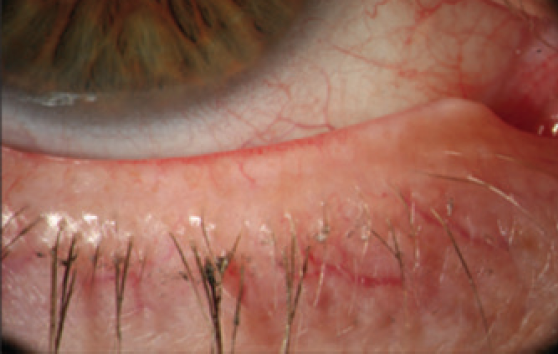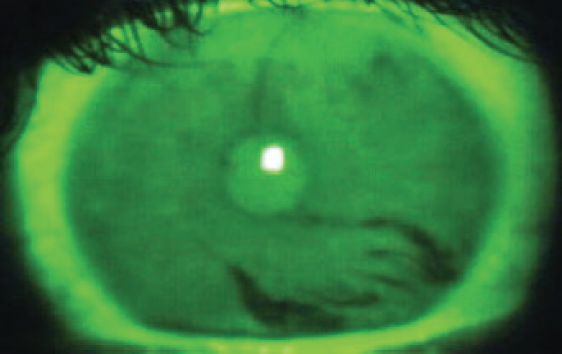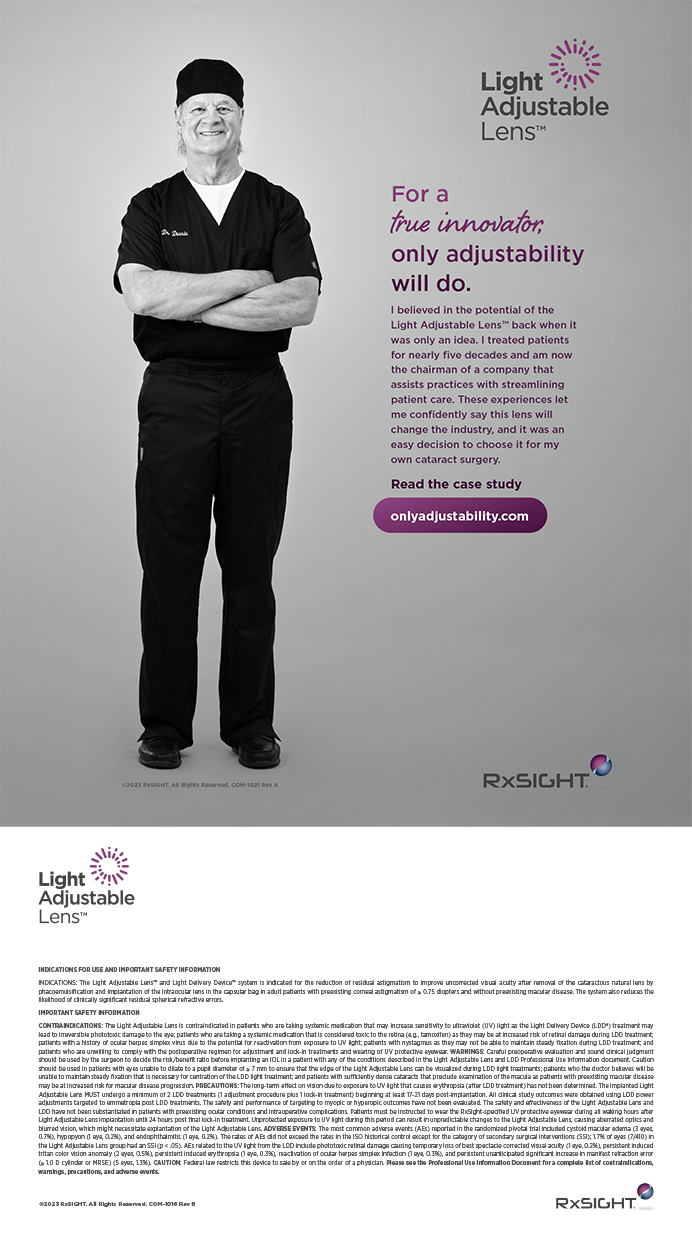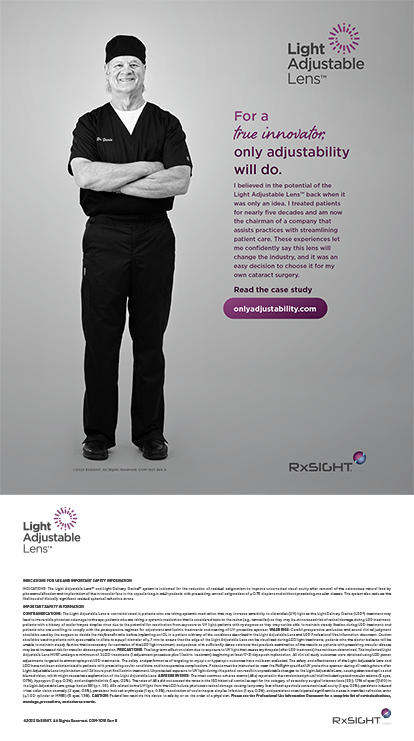Meibomian gland dysfunction (MGD) or posterior blepharitis is typically associated with alterations in the quality or quantity of lipid produced by the meibomian glands (Figure 1). The result is an unstable tear film, leading to ocular discomfort and blurred, fluctuating vision (Figure 2). This, in turn, has a negative effect on an individual’s quality of life. Dry eye disease (DED) can result from multiple causes. DED that is primarily due to meibum deficiency or to combined meibum and aqueous deficiency is much more common than pure aqueous tear deficiency DED, comprising more than 80% of clinically significant DED.1

Figure 1. Slit-lamp photo of a patient with severe meibomian gland dysfunction with epithelialized gland orifices and telangiectasia.

Figure 2. An early inferiorly located streak pattern in fluorescein breakup of the tear film typical of meibum-deficient DED.
Use of omega-3 and omega-6 polyunsaturated fatty acids in the treatment of DED has increased dramatically over the past decade, supported by published studies.2,3 Omega-3s exert antiinflammatory properties by competing with arachidonic acid and inhibiting proinflammatory eicosanoid production. They also regulate lipid synthesis.
Numerous preparations of these substances are available as both over-the-counter (OTC) supplements and prescription medicines. There are no definitive guidelines for how to integrate this modality into the treatment armamentarium for DED, and published studies have reported conflicting results.2-5
Based on my own experience and the literature to date, here are five things I believe you need to know about oral essential fatty acid treatment for DED.
No. 1: More evidence for supplementation is needed. The most recent Cochrane systematic review suggests a possible role for long-chain omega-3 supplementation in managing DED.5 However, inconsistency of reporting has led to an inability to synthesize evidence.
No. 2: Systemic polyunsaturated fatty acid supplementation is generally recommended, but no specific treatment recommendations have been outlined. Several impactful consensus documents, including the AAO’s Preferred Practice Pattern for Dry Eye Disease and the Tear Film and Ocular Surface Society’s Dry Eye Workshop II,6,7 recommend the use of systemic polyunsaturated fatty acid supplements for moderate DED. However, no specific treatment recommendations have been outlined with respect to dosing, duration, and choice of preparation.
No. 3: Prescription or OTC? Similarly, there are no evidence-based recommendations regarding use of prescription treatments versus OTC supplements.
No. 4: Benefits from in-office procedures. Clinical experience suggests that in-office therapeutic procedures for DED, performed prior to oral essential fatty acid treatment to reset the meibomian glands and lid margin health, can improve ocular surface parameters and patient symptoms.8
No. 5: Treatments work, but they can be costly to the patient. Treatment of DED with systemic polyunsaturated fatty acid supplements is generally regarded as safe and without serious risks, but some preparations can be costly.
Reesterified Omega-3 Supplements
By Laura Straub, Editor-in-Chief
Some studies point to the benefits of reesterified omega-3 supplements in patients with DED. In one study,1 patients who received reesterified omega-3 supplements experienced a statistically significant reduction in tear osmolarity, the study’s primary endpoint, and Ocular Surface Disease Index symptom scores and matrix metallopeptidase-9 productivity. Patients also experienced a statistically significant improvement in tear breakup time at weeks 6 and 12.
1. Epitropoulos AT, Donnenfeld ED, Shah ZA, et al. Effect of oral re-esterified omega-3 nutritional supplementation on dry eyes. Cornea. 2016;35(9):1185-1191.
CONCLUSION
Evidence suggests that supplementation with systemic polyunsaturated fatty acids can help to improve DED symptoms, but there is more left to learn. For instance, what is the correct dosing and duration? And is it best used as an adjunctive therapy or as a first-line treatment?
The answers to these questions are likely variable based on the individual’s level of disease and severity of symptoms.
1. Akpek EK, Klimava A, Thorne JE, Martin D, Lekhanont K, Ostrovsky A. Evaluation of patients with dry eye for presence of underlying Sjögren syndrome. Cornea. 2009;28:493-497.
2. Epitropoulos AT, Donnenfeld ED, Shah ZA, et al. Effect of oral re-esterified omega-3 nutritional supplementation on dry eyes. Cornea. 2016;35(9):1185-1191.
3. DRY eye redefined: TFOS DEWS II Report. Tear Film & Ocular Surface Society. www.tfosdewsreport.org/. Accessed May 22, 2018.
4. Dry Eye Assessment and Management Study Research Group; Asbell PA, Maguire MG, Pistilli M, et al. n-3 fatty acid supplementation for the treatment of dry eye disease. N Engl J Med. 2018;378(18):1681-1690.
5. Downie LE, Ng SM, Lindsley KB, Akpek EK. Omega-3 and omega-6 polyunsaturated fatty acids for dry eye disease. Cochrane Database Syst Rev. 2019;12(12):CD011016.
6. Akpek EK, Amescua G, Farid M, et al. Dry eye syndrome preferred practice pattern. Ophthalmology. 2019;126(1):P286-P334.
7. Jones L, Downie LE, Korb D, et al. TFOS DEWS II management and therapy report. Ocul Surf. 2017;15(3):575-628.
8. Qiao J, Yan X. Emerging treatment options for meibomian gland dysfunction. Clin Ophthalmol. 2013;7:1797-1803.




